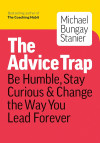The Making of a Manager
What to Do When Everyone Looks to You
"The Making of a Manager" provides a modern, experience-based approach to management, focusing particularly on the challenges faced by first-time managers in technology companies. Drawing from her experience becoming a manager at age 25 at Facebook, Julie Zhuo breaks down the core aspects of effective management into actionable frameworks and practical advice.
The book addresses the fundamental transition from individual contributor to manager, explaining how to lead teams, give effective feedback, and make strategic decisions. It stands out by focusing on contemporary management challenges in fast-growing technology companies, offering specific guidance for different management scenarios and team sizes.
Zhuo's approach emphasizes that management is a skill that can be learned and improved through deliberate practice, providing frameworks for everything from one-on-one meetings to hiring decisions.
By reading "The Making of a Manager", you will:
- Master the transition from individual contributor to manager: Understand the key mindset shifts required and how to focus on outcomes rather than activities
- Develop essential management skills: Learn how to give effective feedback, run productive meetings, and make better hiring decisions
- Scale your management approach: Adapt your style as your team grows from a handful of people to dozens of reports
- Build and maintain high-performing teams: Create processes that drive results while keeping people happy and engaged
Books to Follow
- "StrengthsFinder 2.0" by Tom Rath: Provides tools and frameworks for identifying personal leadership strengths. Particularly valuable when transitioning to management, as it helps identify how your individual talents can be best applied in a leadership role. While Zhuo focuses on what managers should do, this helps understand how to do it authentically based on your natural strengths.
- "StandOut" by Marcus Buckingham: Focuses on understanding your distinctive leadership style and how to leverage it effectively. This assessment-based approach helps managers develop authentic leadership approaches rather than trying to force-fit standard management practices. Complements Zhuo's practical management frameworks by helping readers adapt them to their natural working style.
- "The Manager's Path" by Camille Fournier: Provides a detailed roadmap of the technical management career ladder, from individual contributor through tech lead to senior management. While Zhuo focuses on the fundamental skills of management, Fournier shows how these skills evolve at each level of leadership in technology organizations.
- "The Hard Thing About Hard Things" by Ben Horowitz: Dives deep into the challenging aspects of management that Zhuo introduces, particularly around giving feedback and having difficult conversations. Offers seasoned perspective on handling the emotional and interpersonal challenges of leadership.
- "The Coaching Habit" by Michael Bungay Stanier: Expands on the one-on-one meeting and feedback concepts with specific questioning techniques and coaching frameworks. Provides deeper tools for the developmental aspects of management that Zhuo introduces.
Management is About Outcomes
Success in management is measured by the results your team achieves, not by how many meetings you hold or processes you create. Focus on whether your team is consistently delivering great results rather than on management activities.
Different Paths to Management
There are three common routes to management (apprentice, pioneer, and new boss), each with unique advantages and challenges. Understanding your path helps you navigate early challenges and leverage your position’s strengths.
Feedback Framework
Effective feedback should be activity-specific, timely, and incorporate multiple perspectives (360-degree feedback). This approach makes feedback more actionable and objective while reducing emotional tension.
Meeting Effectiveness
Great meetings require both clear purpose and clear intended outcomes. Simply having an agenda isn’t enough - you need to know what success looks like for each meeting and ensure the right people are involved.
Hiring Strategy
Make recruitment decisions based on a one-year plan that considers team gaps, growth projections, and diversity needs rather than reactively filling positions. This ensures strategic team building rather than firefighting.
Management Scale
Leading larger teams requires shifting from direct to indirect management, which brings unique challenges in maintaining influence and approachability while letting go of day-to-day decisions.
Q: How do you know if you’re ready for management?
A: Rather than focusing on readiness, consider whether you’re interested in the core aspects of management: getting better outcomes through others, developing people, and creating effective processes. Technical expertise is less important than these fundamental interests and capabilities.
Q: How should new managers approach their first few months?
A: Focus on understanding your team’s current state, building relationships, and learning the business context. Avoid making major changes immediately unless absolutely necessary. Use one-on-ones to understand team members’ perspectives, goals, and challenges.
Q: What’s the best way to transition from peer to manager?
A: Acknowledge the relationship change openly with former peers. Focus on supporting their success rather than proving your authority. Build trust through consistent, fair treatment and clear communication about your new role’s responsibilities.
Q: How do you balance individual work with management responsibilities?
A: Gradually reduce individual contributor work as management responsibilities grow. Prioritize activities that only you as a manager can do, such as providing feedback, removing obstacles, and making key decisions. Learn to delegate effectively and trust your team.
- When receiving your first management role: You need practical guidance on the fundamental mindset shifts and day-to-day practices of leading others. The book is particularly valuable for individual contributors transitioning to management, providing concrete frameworks for common first-time manager challenges.
- When struggling with team dynamics as a new manager: Your relationships with former peers have changed, or you’re finding it difficult to balance being friendly while being the boss.
- When taking over an existing team: You need to understand how to build trust and establish authority without alienating team members who already have established ways of working. Zhuo’s experience as both an apprentice manager and new boss provides valuable insights for this transition.
- When realizing that your technical skills aren’t enough anymore: Your role increasingly requires people skills, emotional intelligence, and strategic thinking rather than technical expertise.
- When your team is growing from a handful to dozens: You need to adapt your management style from directly managing individuals to leading through layers.

Your support helps me maintain and improve the book recommendations for everyone.






